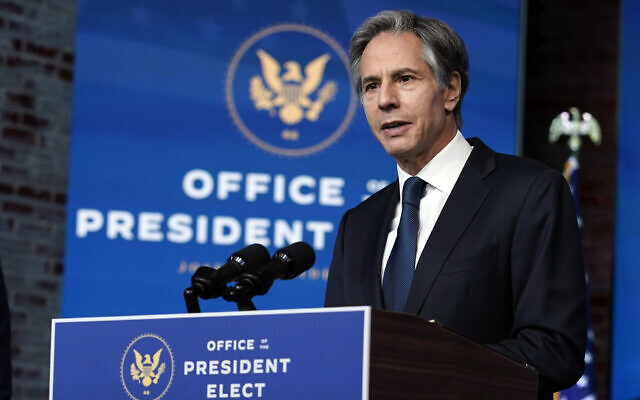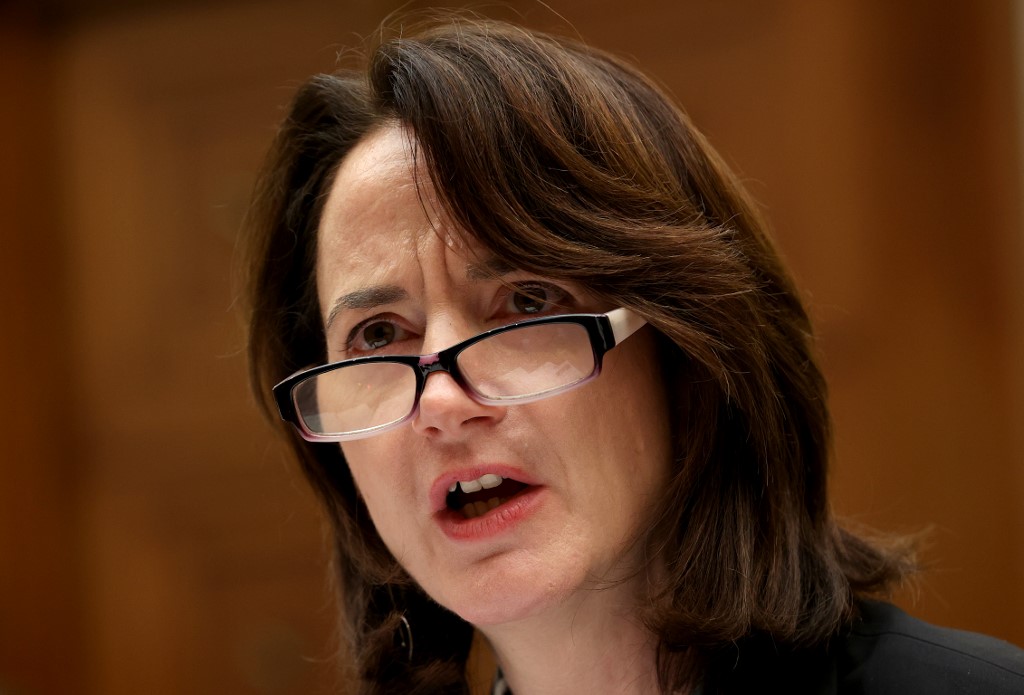NEW YORK — US President-elect Joe Biden on Tuesday introduced his nominees for key members of his national security and foreign policy team, declaring that “America is back, ready to lead the world.”
“These public servants will restore America’s global leadership and moral leadership,” Biden said as the six men and women stood behind him wearing face masks.
Here’s what you need to know about the group of appointees who, if confirmed, will enter their posts with a wealth of experience, even while checking many “firsts” boxes.
1. Secretary of State nominee Blinken is a ‘mensch’ who wants to build on the Abraham Accords
Former colleagues of Tony Blinken who spoke with The Times of Israel could not have been more effusive in their praise for the longtime diplomat. Ex-White House Middle East envoy Dennis Ross highlighted the “intellectual honesty to him, in that he doesn’t keep a position if he realizes after the fact that it is not the right one.”
In an interview with The Times of Israel last month, Blinken said he supports the Abraham Accords brokered by the Trump administration between Israel, the United Arab Emirates and Bahrain. He expressed hope that as more countries normalize relations with Israel, Jerusalem will feel more secure and more willing to advance the peace process with the Palestinians as well.
“He’s a mensch above all else,” said Conference of Presidents of Major American Jewish Organizations executive vice president Malcolm Hoenlein.
Blinken also has a lighter side, which includes a ’70s-inspired band cleverly called Ablinken that has two tracks on Spotify.
For more on the secretary of state nominee, see The Times of Israel’s profile of him.

US President-elect Joe Biden’s nominee for secretary of state, Tony Blinken, speaks at The Queen theater, November 24, 2020, in Wilmington, Delaware. (AP Photo/Carolyn Kaster)
2. National security adviser pick Sullivan brokers ceasefires and nuclear accords
At 43, Jake Sullivan will be one of the youngest national security advisers in decades, yet he brings with him a wealth of experience on the international stage. Sullivan served as national security adviser to Biden when he was vice president. Before that, he was a longtime aide to secretary of state Hillary Clinton and was credited for launching the secret talks with Iranian officials in 2012 that laid the groundwork for the nuclear deal. That same year, he played a key role in brokering the ceasefire that ended Operation Pillar of Defense, launched by Israel in response to Hamas rocket fire from Gaza.
Both of those efforts were highlighted by Biden when he introduced Sullivan on Tuesday.
While described by Democratic strategists as an ally of Israel, he, like many in his party, does not appear to be especially enamored of Prime Minister Benjamin Netanyahu and his policies.
A dump of Clinton’s email correspondences by Wikileaks showed Sullivan mocking as insincere an apology made by Netanyahu after warning in a 2015 election day video that Arabs were “coming out in droves” to vote against him.

US President-elect Joe Biden’s national security adviser nominee Jake Sullivan speaks at The Queen theater, November 24, 2020, in Wilmington, Delaware. (AP/Carolyn Kaster)
3. United Nations envoy nominee Thomas-Greenfield was a groundskeeper at Liberia’s embassy… while serving as ambassador
If confirmed by the Senate, Linda Thomas-Greenfield would be neither the first African American, nor the first woman, nor even the first African American woman, to serve as US ambassador to the United Nations. But she’s a groundbreaking diplomat nonetheless. Thomas-Greenfield joined the State Department more than three decades ago, when Black women were even more of a rarity in the US diplomatic corps than they are today.
In her 35 years as a diplomat, she’s held roles such as deputy assistant secretary in the Bureau of Population, Refugees and Migration; US ambassador to Liberia; and more recently, assistant secretary of state for African affairs under former president Barak Obama.
In a 2018 Ted Talk, she revealed how her childhood in the deep south helped shape the diplomat she has become.
“I [grew up] in a segregated town in which the KKK regularly would come on weekends and burn a cross in somebody’s yard,” Thomas-Greenfield said then. “But I had the hopes and dreams of my mother who taught me I could face any challenge in my path by being compassionate and kind.”
Linda Thomas-Greenfield grew up in a town where the KKK burned crosses on lawns.
“But I had the hopes and dreams of my mother who taught me I could face any challenge in my path by being compassionate and kind.”
Next year, she will serve as our ambassador to the United Nations. pic.twitter.com/tlEkvMMAnQ
— Congressmember Bass (@RepKarenBass) November 24, 2020
An example of that compassion shined through in a story about Thomas-Greenfield shared on Twitter by writer Molly McKew after the nomination was announced on Monday.
“LTG became Ambassador in Liberia when I was working there. Pretty much the first thing she did was walk outside the gates of the embassy compound — startling the Marine guards to no end — and start picking up the trash that lined the road,” McKew wrote.
“She viewed it as her job. She approached everything from a practical perspective — always an American thrilled and honored to be on this adventure, always aware of what she represented and what she carried with her,” she added.
Halie Soifer, a longtime Washington national security aide and current executive director of the National Jewish Democratic Council, told The Times of Israel that working with Thomas-Greenfield left her with the impression that the UN envoy nominee is “eminently qualified.”
Citing Thomas-Greenfield’s decades of diplomatic experience, Soifer asserted that the seasoned diplomat was perfectly suited to serve in the Biden administration, which will be working to reassert the importance of multilateralism as a core tenet of its policy.
Thomas-Greenfield said as much upon being introduced by Biden on Tuesday: “America is back. Multilateralism is back. Diplomacy is back.”
While Thomas-Greenfield’s focus at State rarely extended to matters of Israel policy, Soifer said that the nominee’s familiarity with the African political sphere will be an asset at the UN as far as Israel is concerned, because the Jewish state has long sought the support of the bloc to thwart anti-Israel resolutions.

President-elect Joe Biden listens as his nominee for U.S. Ambassador to the United Nations , Ambassador Linda Thomas-Greenfield, speaks at The Queen theater, Tuesday, Nov. 24, 2020, in Wilmington, Del. (AP Photo/Carolyn Kaster)
4. Director of National Intelligence nominee Haines is in line to become the first woman to lead the agency
Avril Haines served as CIA deputy director and deputy national security adviser in the Obama administration, gaining a reputation as a no-nonsense teller of tough truths.
“I picked a professional,” Biden said Tuesday. “A fierce advocate for telling the truth and leveling it with the decision makers… I know because I’ve worked with her for over a decade. Brilliant. Humble. Can talk literature and theoretical physics, fixing cars, flying planes, and running a bookstore cafe, all in a single conversation — because she’s done all of that.”
On Israel, Haines appears to take a more critical approach than others in the incoming Biden administration, signing a letter urging the Democratic Party to update its platform to include explicit opposition to settlement expansion and occupation in addition to language supporting Palestinian rights.
Much of the requests in the letter were rejected by Biden and other traditional pro-Israel members of the party, who sufficed with emphasis of the need for a two-state solution to end the conflict.

In this file photo taken on January 13, 2020 Avril Haines, former deputy national security adviser and former deputy director of the Central Intelligence Agency, testifies before the House Foreign Affairs Committee in Washington, DC. (WIN MCNAMEE / GETTY IMAGES NORTH AMERICA / AFP)
5. Mayorkas would not be the first Jew to head the Homeland Security Department, but but he’d be the first Latino and immigrant in the post
Like Blinken, Alejandro Mayorkas was raised by a Holocaust survivor, his mother, who escaped Romania and settled in Cuba. The nominee for DHS secretary was born there and fled with his family to America as a refugee when he was a child.
As deputy DHS secretary under Obama, Mayorkas worked closely with Jewish groups and spoke often about the specific threats facing American Jews.
Speaking in 2016 to the annual Washington conference of the Orthodox Union about nonprofit security grants, Mayorkas said, “The need is most acute in the Jewish community because of the ascension of anti-Semitism and hate crimes we see.”
Mayorkas grounded his concern in his background and his upbringing. Among the things that “keep me up at night,” he said at the time, was the threat to “my community,” the Jewish community.
If confirmed, Mayorkas and Blinken would join Treasury Secretary nominee Janet Yellen and Chief of Staff Ron Klain in raising the Tribe representation on the cabinet to four.

US President-elect Joe Biden’s Homeland Security Secretary nominee Alejandro Mayorkas speaks at The Queen theater, November 24, 2020, in Wilmington, Delaware. (AP Photo/Carolyn Kaster)
6. Kerry may not have brokered Middle East peace, but there’s plenty left in the tank
Former secretary of state John Kerry, tapped as White House special envoy on climate, is the most senior and well-known of the bunch introduced on Tuesday.
Jerusalem and Ramallah saw a lot of Kerry in 2013 and 2014 when he shuttled back and forth between the two cities in a desperate attempt to bring the sides together in an agreement that analysts speculated he wanted more than Israelis and Palestinians.
The Israeli government soured on Kerry rather quickly, with then defense minister Moshe Ya’alon calling the secretary of state “messianic” and “obsessive” in his efforts.
But it is that passion that may make Kerry the perfect fit to represent the Biden administration in the uphill battle against climate change.
“John Kerry was very passionate about climate change since his days in the Senate. He spoke about it long before others did. I am sure he will bring the same passion to his new role. It will be a case where the person meets the moment,” said Washington Institute for Near East Policy scholar David Makovsky, who worked with Kerry on the Israeli-Palestinian peace negotiations.
“Nobody should underestimate his commitment to see through his goals and his commitment to work with allies,” Makovsky added.

Secretary of State John Kerry stands with Justice Minister and chief negotiator Tzipi Livni, left, and Palestinian chief negotiator Saeb Erekat, after the resumption of Israeli-Palestinian peace talks, Tuesday, July 30, 2013, at the State Department in Washington. (AP/Charles Dharapak)
7. A Palestinian-American will be the next deputy legislative director
Along with the new national security team members, the Biden transition team also introduced a pair of deputy legislative directors. Longtime House staffer Shuwanza Goff will be the first Black woman to hold the position and Reema Dodin will be the most senior Palestinian-American woman to ever serve in the executive branch.
A longtime staffer for Illinois Senator Dick Durbin, Dodin has become “a fixture of the Senate, who knows what’s happening in the Senate before most senators do,” Soifer said.
In 2017, Dodin co-authored “Inside Congress: A Guide for Navigating the Politics of the House and Senate Floors in 2017.”
Her parents are Jordanian-Palestinian, but her family traces its roots back to the southern West Bank village of Dura.
Related posts:
Views: 0
 RSS Feed
RSS Feed

















 November 25th, 2020
November 25th, 2020  Awake Goy
Awake Goy  Posted in
Posted in  Tags:
Tags: 
















